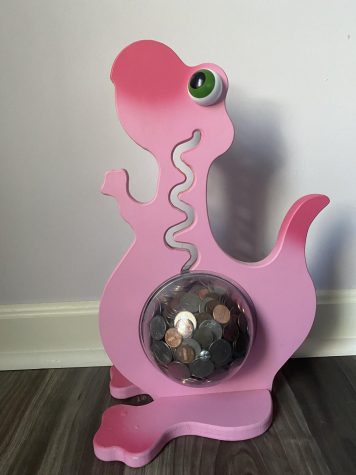The Great Coin Shortage of 2020: Piggy banks remain full while banks are empty
Cashiers now ask, “Do you have exact change?”
With the coin shortage and online payments coins have become for collectors and not everyday use.
November 26, 2020
How many of you have a half-full jar or piggy bank on your shelf? My piggy bank dinosaur weighs 10 pounds and lives in my closet. As a kid, I loved collecting coins until it was filled so that one day I could bring it to the bank to put in my bank account.
I may even give my piggy bank dinosaur to my children so they can see what dinosaurs and coins looked like, because one day coins may be extinct with the dinosaurs.

Before 2020, fewer people were using cash and change in stores, but the pace of the cashless society has increased. The pandemic has created so many issues, one of them being the coin shortage. Coins are in reduced quantity because people were unable to spend them when businesses were closed. People have been saving their coins that they were unable to use, and I’ve been doing the same. I love coins. The coin shortage makes me realize how much I miss them.
My childhood enthusiasm for coins wore off until I had a job and a car. Few teens go to their piggy banks for spending money, but I like “exact change.”
When I went to Dunkin’ or California Tortilla, I would only pay with cash and would get change. At first I hated it: it always seemed like my change would be 99 cents. Ninety-nine cents is the worst possible amount ever.
Returning to my childhood passion, collecting my change has since become fun for me. After I go somewhere, I put the coins into my jar and watch as it fills up. An added bonus is that sometimes I’ll get my friends’ change because they don’t want to carry it around.
Dakota Wheat, Class of 2022, said, “I dislike coins a lot. They are easy to lose and make a lot of noise. Also, they are dead weight in my wallet because I always forget to use them.”
Recently coins have become scarce. I am worried!
The coin shortage began when business began reopening, before when the businesses were closed, due to Covid-19, the coins in circulation decreased dramatically. The U.S. Mint, which produces the coins, decreased their staff in response to the pandemic; this decreased the amount of coins in circulation. This makes sense, the fewer businesses that are open, the less money needed in circulation.
In June, the U.S. Mint produced 1.6 billion coins and is producing about the same amount for the rest of the year. The coin industry will be able to rebuild itself when coins come back to the Federal Reserve from businesses reopening, but this will take time.
When businesses began reopening this summer, at first, they saw a decrease in coins. Many stores require exact change. Even recently, at Target they only have a few checkout lanes where customers can pay with cash.
Senior Bailey Bennett worked all summer at the Mt. Airy Jimmie Cone. “We always had more than enough coins to refill the registers. We did, however, have employees sell their rolled coins from tips back to Jimmie Cone if they wanted to help out.”
As a seasonal ice cream shop, Jimmie Cone was greatly affected by the pandemic. They opened two months later than usual and, for the first time, began to accept credit cards.
“Accepting cards was something we had considered for some time. But with folks being concerned about the germs on cash, we felt like we needed to make the switch,” said Chelsea Hamilton, a Jimmie Cone manager.
How can you help without breaking the piggy bank?
USA Today stated that people can help the coin circulation “by taking coins to their local banks or Coinstar kiosks and, when paying with cash, using exact change.”
Sue Hoefs, Lending Director at Skypoint Federal Credit Union in Germantown, said, “ On a regular basis we order cash and coins from the Federal Reserve for distribution to our customers. Due to the coin shortage we are limited as to how much coins we can order. It has been a tough balance because normally our coin counter machines are very popular with our members because they are free to use, but due to Covid-19 safety measures we had to close them temporarily.”
Hoefs also stated that as the COVID-19 pandemic eases with a vaccine, the shortage will most likely gradually decrease.
Many stores are asking customers if they want to “round up” and make a donation. That way, there is no change involved. Kroger, Ace Hardware, Walmart, and many others are asking customers to round up their total for donations.
For years now customers have begun only paying with credit cards. It’s become rare to see people paying with cash, and even rarer is checks. Paying large grocery bills will cash is just time consuming. The cashier has to make sure large bills are authentic. Credit and debit cards are much faster and easier to use.
Saving coins is a nice way to get a bonus for spending money. If you have extra coins laying around you can help the shortage by putting the money into your bank account, paying with exact change, or turning them in for cash. Doing this will help bring more coins into circulation.
But don’t forget to wash your hands after handing any cash!



